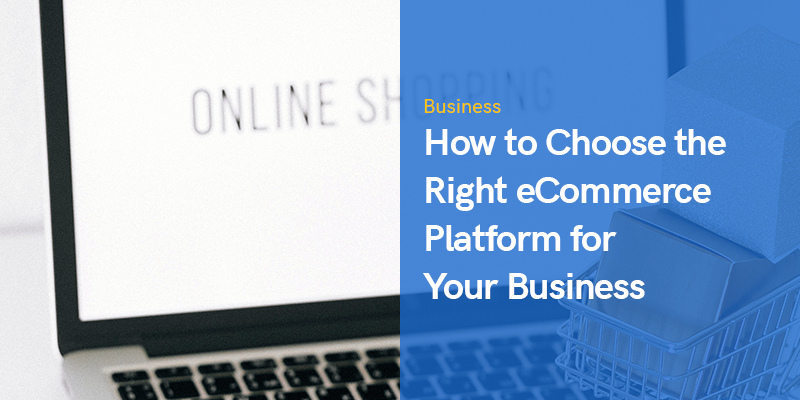
How to Choose the Right eCommerce Platform for Your Business in 2025
In 2025, choosing an eCommerce platform is vital for your business as online shopping changes. There are many platforms to choose from and it can be confusing.
Whether you’re new or expanding, pick a platform that matches your goals, budget, and growth plans for lasting success.
This guide highlights essential features, costs, scalability, and integration possibilities to help you decide which platform is right for you.
Understanding Your Business
Know what your business needs before selecting an eCommerce platform. Define your goals and consider your product, market, and budget. Identify your available resources. Here are some things to keep in mind:
Define Your Business Objectives and Growth Ambitions
Are you looking to sell locally, nationally, or globally? Are you looking for subtle expansion or focusing on your niche in the current market?
These questions will be the primary factor for selecting the appropriate eCommerce platform for your enterprise.
Shopify and BigCommerce are the most used online shopping platforms. They are the first choice of entrepreneurs with immediate growth demands and they need improvements.
However, if you are a small company or you want to focus on a particular region, it can make sense to be comfortable with Squarespace or Wix as well.
Recognize Your Product and Market Specifics
The platform you choose will depend on whether you’re selling physical, digital, or subscription products.
For example, Shopify provides you with a comprehensive inventory management system which is very helpful for the retail of physical products, while WooCommerce can do the same thing for businesses that are selling digital products and the ones that need more customization.
In addition, some platforms are equipped with industry-specific tools, such as Magento, which was designed specifically for large B2B companies.
Calculate Your Budget and Resource Availability
Your budget will determine the kind of platform you can choose. For example, companies centered mainly on services that have a more delicate texture such as hosting and development but offer more of the artistic aspect.
Certain parts of the technical aspects are going to be automated, while the others will be simple and straightforward to the point where the end-user does not need to know any technical details.
The experience and technical proficiency of your team should be a major consideration when assessing the capabilities of the platform as well.
Some sites might need more manual functionality, while others might be, like Wix and Squarespace, easier for people who have non-technical backgrounds.
Key Features to Consider
Several key features must be analyzed in choosing an ecommerce platform to make sure that operations run smoothly.
Below are essential features to consider:
User-Friendly Design for Seamless Experience
Pick a site that is simple to use, like Shopify or Wix. Both have clear displays for new or experienced users to set up stores easily.
Customization Capabilities for Unique Branding
Your platform needs branding flexibility. BigCommerce and WooCommerce provide many customization options to make your site personalized to your brand identity.
Importance of Mobile Optimization in 2025
As mobile shopping is on the rise, opting for a system with integrated mobile optimization is advisable. Shopify and Squarespace give clients responsive themes that automatically adjust for mobile devices.
Payment Flexibility: Accepting a Range of Methods
To highlight the importance of e-commerce website functionality, it is crucial for platforms to support various payment methods, offering shoppers choices. Credit cards and digital wallets are essential. Shopify and BigCommerce provide flexibility with numerous payment gateways.
Security Essentials: Safeguarding Transactions and Data
Be sure to check that the platform has the latest security features, such as SSL certificates and PCI compliance. In this regard, Magento and Shopify Plus are those that have the best security features.
Enhancing Visibility with SEO Tools
For driving organic traffic, SEO tools play a very important role. WooCommerce and BigCommerce are such platforms that come with pre-installed SEO tools, which therefore guarantee that product pages would improve search positions through optimization.
Scalability and Performance: Planning for Growth
The platform must be able to grow your business. Shopify and BigCommerce provide scalability such that, as the business increases, there is room for more products and an increase of traffic.
Speed Matters: Ensuring Smooth Customer Experiences
It is the speed of the website that either guarantees customer satisfaction or its absence. Shopify Plus and Magento are very good at the highest of the scales and have the fastest load times, even under the most massive traffic levels.
Cloud-Based vs. On-Premise Solutions
In the case of Cloud platforms like Shopify and BigCommerce, they can automatically scale and update although it is self-hosted platforms like WooCommerce and Magento that give you greater control over the business but they also require technical management.
Understanding Initial and Ongoing Costs
Shopify has easy pricing plans, while on the other hand, WooCommerce is free but some costs will be incurred in the form of hosting, themes, and plugins.
Evaluating ROI Beyond the Initial Investment
Look at the whole, that is to say, it is possible that although Magento will cost more to set up; its customization options cater to a greater return as compared to the other platforms in the long term.
Identifying Hidden Fees and Unexpected Expenses
BigCommerce and Shopify are straightforward and transparent with their pricing. However, WooCommerce, on the other hand, may be required to pay a bit higher due to the need for plugins, themes, and third-party integrations.
Adapting the New Technology
Go for a more approachable solution, one that offers the possibility to connect with your CRM, ERP, & marketing tools. Your marketing tools from WooCommerce and Shopify interconnect with different business tools that you can use and this is where you will get a direct benefit.
API Integrations for Flexibility
The likes of Magento and BigCommerce also come with robust APIs that allow the connection between different tools and services thus creating a tailored solution.
Integrating With Marketplaces and External Channels
Diversify your presence, one of the efforts being the main marketplaces. Shopify and BigCommerce are easy to integrate within Amazon, eBay, Etsy, and any other associated sites of third parties.
Access to Round-the-Clock Customer Support
Make sure that customer support is reliable. Shopify and BigCommerce offer 24/7 customer support through chat, phone, and email with which you can solve problems without delay.
The Value of Self-Service Resources and Documentation
Search for more detailed self-help items. On the Wix and WooCommerce platforms, help articles and community forums on topics like profiles and dispute settlement are provided in an open, engaging manner.
User Communities for Support and Insights
Thanks to the live interaction and the exchange of experiences with e-commerce communities online, such as Magento and WooCommerce you will have in your hands a lot of the solutions to the problems you are dealing with and you will also be able to learn from other people's experiences.
Integrating Emerging Trends and Technologies
For one to be competitive in the year 2025, AI, Voice Commerce, AR/VR, and Social Media need to be merged into their eCommerce platform.
AI is the way that companies are going to provide personalization and shopping experience improvements through social media and eCommerce integration and that is how Shopify and BigCommerce platforms are doing it.
Hosted vs. Self-Hosted Platforms
Hosted platforms such as Shopify and Wix handle maintenance and security so you do not have to worry about it. On the other hand, self-hosted platforms like WooCommerce and Magento allow you to change, form, and handle your own server as you want.
A decision of whether to go with the first option—full control of the purchasing experience—or give the reins to someone else is in your hands.
Making the Final Decision
Before the final decision, the user should analyze the following aspects in the selection of software:
Trial and Error: The Importance of Testing Platforms
Try out different platforms for free through trials or demos to understand which one will meet your needs the best before you sign up.
Consulting Experts and Peers Before Commitment
Seek advice on the most suitable platform from professional experts and other small business owners to be cautious and to avoid common mistakes.
Keeping Aligned with Your Platform Option and the Growth Plans
Identify a service that bundles your desired features and that will grow with you, is accurate to your data, and can transform in parallel with your business goals. Opt for a service that is the best fit for your business also in terms of growth, scalability, and innovations in business.
Choose the Right eCommerce Platform
Choosing to open up your own online store is a dream come true for many business owners. However, it isn't as easy as many people believe it to be. There are so many factors to consider before you can actually get started.
Still, selling products online is, indeed, a profitable venture. As a matter of fact, global retail eCommerce sales have reached $4.28 trillion in 2024 and experts estimate that global sales will reach $5.4 trillion by 2024.
That's why it's important to do everything right and take the time to consider your options. In other words, you can't simply start selling things on your website. What you'll need is either a custom-developed eCommerce platform or a premade solution.
Both choices are viable but it comes down to what you need and what you can afford. After all, you want the best results that suit your budget the most.
With that in mind, here are a few things to consider when choosing the right eCommerce platform for your business.
Cloud-based eCommerce Platforms
Premade eCommerce solutions work based on the SaaS (Software as a Service) model. They are previously built platforms you can implement on your website with relative ease.
These platforms are priced based on a subscription model, which means you'll have a fixed monthly or yearly fee for using their services and software.
Some of the most popular cloud-based eCommerce platforms are Shopify, Magento, BigCommerce, and so on. Most business owners choose these platforms because they have a lot of advantages to offer. Here are a few examples:
- Fixed costs and no capital expenditure.
- You can set everything yourself without having to be tech-savvy.
- No need to hire professional developers.
- Exceptional tech and customer support.
- Improved security features.
- Well-optimized servers for handling increased traffic.
However, cloud-based platforms are not without their limitations, which is also something that needs to be considered before you make your decision. Here are a few disadvantages of using cloud-based All-In-One Ecommerce Platforms.
- Lack of customization or personalization features for your online store.
- Scaling options may be problematic.
- Platform owners can decide to remove a feature, which means you won't be able to use it anymore.
Self-hosted eCommerce Platforms
The other option is to create your own platform from scratch. This is a major endeavor that requires a lot of time, effort and resources. As you might imagine, this can turn into a major undertaking for any business owner.
The costs of development alone can have a significant impact on your budget. Even if you use open-source solutions, such as the WooCommerce plug-in for WordPress, you'd still need to do a lot of things yourself.
As a result, you'll have complete control over your eCommerce platform and the flexibility to do with it as you see fit. The main advantage is that you'll have a fully customized and personalized online store with the ability to scale accordingly as your business grows.
Still, it's a long way to go and there'll be plenty of obstacles to overcome if you choose to make your own platform. Here are a few things you'll need to focus on.
- Finding a suitable hosting provider with optimized servers.
- Hiring a developer to create and design your website if you don't know how.
- Further negotiating with a developer to maintain and update your store regularly.
- Create custom features and plug-ins.
- Ensure website security on your own, such as procuring a TLS/SSL certificate, for instance.
- Comply with industry and security standards.
- Procure payment and personal information processing solutions.
What to look for in an eCommerce platform?
If you decide to choose a premade solution, there are still many factors to consider, including the specific ecommerce platform requirements that will determine the best fit for your business. You must take your own business goals into consideration, as well as consider the needs of your potential customers.
The most important thing is not to rush your decision. Instead, take the time to research what each platform has to offer so that you can assess the situation accordingly.
In the end, you'll be able to decide whether a cloud-based platform or a self-hosted one is a better choice for your business. Now, here are a few things to keep an eye out for when researching potential platforms.
Mobile-friendliness
The platform you choose should be properly optimized for mobile. As you may already know, mobile traffic is predominant these days and most online consumers use mobile devices to both browse online stores and make purchases.
Moreover, many Internet marketing experts suggest that mobile-friendly websites rank better on search engines like Google, especially since Google released their mobile-first indexing.
Last but not least, make sure that the eCommerce platform supports seamless navigation and mobile commerce solutions for mobile users. After all, you want to ensure mobile users are provided with as much convenience as possible at your online store.
If the platform isn't mobile-friendly, then it might not be the right solution for your business. After all, most of the online shoppers are, in fact, mobile shoppers. If mobile consumers cannot access or purchase your products using their mobile devices, they'll simply bounce off.
Choosing a responsive theme like Providence Theme Shopify, Honey Shopify Theme can be a strategic decision to ensure an optimal mobile experience for your customers, enhancing accessibility and increasing the likelihood of successful transactions.
Platform Scalability
Every online store eventually grows and it's ready to elevate to the new level of doing business. This may mean anything from market penetration to entering new niche markets. In that case, your online store will need to support additional products and handle additional traffic generated by the expanded consumer base.
You need to ensure that your eCommerce platform is able to scale accordingly with your business. As mentioned before, this can be problematic if the platform itself doesn't support such features.
You can easily assess the situation by researching whether or not the platform itself supports features, such as CDN (Content Delivery Network), CRM (Customer Relationship Management) software integration and so on.
If the platform is able to scale alongside your store, chances are you choose the right solution for your eCommerce business such as Brown tape e-commerce management systems.
SEO-friendliness
Another thing that's important to check out is whether or not the platform is SEO-friendly. You want your store to be as visible as possible online so that your target audience can easily find and access your store.
Moreover, you want to create exposure and build brand awareness for your store. You cannot do that if the platform isn't SEO-friendly, especially if it doesn't provide you with options to optimize your store yourself.
Many cloud-based platforms have some basic SEO features offered by default, but it doesn't hurt to check out just how SEO-friendly the platform really is. Here are some of the things you should focus on.
- SEO-friendly URLs.
- Updates for title tags and Meta descriptions.
- Custom domain name.
- Access to your XML sitemap.
- Possible integration with Google tools, such as Google Search Console, Google Analytics etc.
- Access to the platform's robots.txt file
- Ability to add captions and descriptions to images.
Pricing and Payment Options
Of course, the logical thing to look out for is the pricing plans and payment options. As mentioned before, cloud-based eCommerce platforms are based on a subscription model, which means the costs are pretty much fixed.
However, it's very important to check if there are any hidden fees and costs that the platform owners failed to mention. You'll have to read the fine print to find if there are any such fees. Moreover, the availability of various payment methods is also a crucial factor to consider.
The platform should offer multiple options, such as PayPal, credit or debit cards, bank transfers and so on. This is important for both how you'll pay for their services and how customers will pay for your products.
If the platform doesn't support multiple payment options, you might want to reconsider your decision. The main reason is that consumers prefer the convenience of having multiple choices so they may abandon their carts if your platform doesn't support their preferred payment options.
Compare and Test
The fact of the matter is that you cannot easily decide which platform is the best choice for your business. Fortunately, almost every cloud-based eCommerce platform provides options for their potential clients to request a demo of a free trial.
That way you can test and compare different platforms before you are ready to make the decision that will transform your website into an online store. You can compare the features, pricing, usability and functionality of every platform accordingly.
If none of the platforms meet your criteria, you can always build your own platform, provided you have the necessary resources to do so.
Conclusion
Thus, by 2025, in order to select an ecommerce solution, you would first need to figure out what your business needs and objectives are.
After that, you would need to take care of things like the sale of more items, different ways to pay, mobile and laptop ease, and security. Make sure to also ponder over things like AI, voice shopping, and social media links that are about to change the world.
To test out the rest of the different services. Please, let the experts facilitate the process for you.
Setting up an eCommerce store for your business can be a challenging task. This is especially true when you have to choose the right platform for your business.
There are many options for you to choose from, which is why it's important to research them all well. That way you'll be able to determine which solution is ideal for your business.
Recommended Posts

10 Best AI Tools for Event Planners & Businesses in 2025
January 22, 2025





